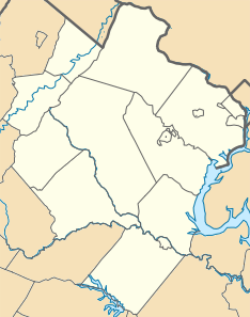White Post Historic District is a national historic district located at White Post, Clarke County, Virginia. It encompasses 23 contributing buildings and 1 contributing object in the crossroads village of White Post. The contributing object is the white-painted marker which Thomas, Sixth Lord Fairfax, had erected in the 1760s (supposedly erected by then-Col. George Washington) to point the way to Greenway Court, his nearby estate.
White Post Historic District | |
 White Post Historic District, March 2022 | |
| Location | VA 658 and 628, White Post, Virginia |
|---|---|
| Coordinates | 39°3′25″N 78°6′17″W / 39.05694°N 78.10472°W |
| Area | 25 acres (10 ha) |
| Built | 1875 |
| Architectural style | Gothic Revival, Queen Anne |
| NRHP reference No. | 83003278[1] |
| VLR No. | 021-0066 |
| Significant dates | |
| Added to NRHP | September 29, 1983 |
| Designated VLR | August 16, 1983[2] |

The most distinguished building is the Bishop Meade Memorial Church (1875), named for White Post's Bishop William Meade, who grew up at the nearby Lucky Hit plantation. Also located in the district and separately listed is Meadea, the only remaining 18th century building.[3] The historic district also includes 20 other residences, 3 commercial structures, as well as the Methodist church and parish hall, and an abandoned post office.
It was listed on the National Register of Historic Places in 1983.[1]
References
edit- ^ a b "National Register Information System". National Register of Historic Places. National Park Service. July 9, 2010.
- ^ "Virginia Landmarks Register". Virginia Department of Historic Resources. Retrieved June 5, 2013.
- ^ Virginia Historic Landmarks Commission Staff (July 1983). "National Register of Historic Places Inventory/Nomination: White Post Historic District" (PDF). Virginia Historic Landmarks Commission. and Accompanying photo and Accompanying map
External links
edit- Media related to White Post Historic District at Wikimedia Commons


